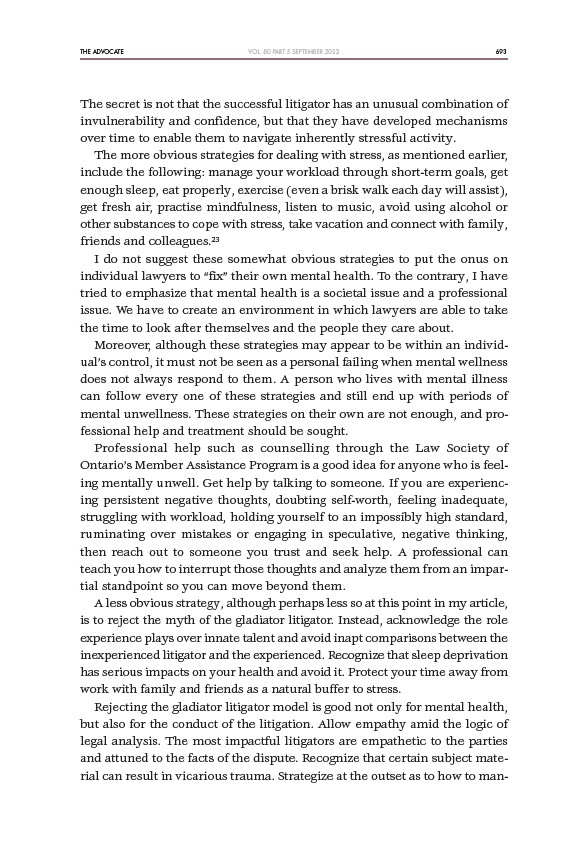
THE ADVOCATE 693
VOL. 80 PART 5 SEPTEMBER 2022
The secret is not that the successful litigator has an unusual combination of
invulnerability and confidence, but that they have developed mechanisms
over time to enable them to navigate inherently stressful activity.
The more obvious strategies for dealing with stress, as mentioned earlier,
include the following: manage your workload through short-term goals, get
enough sleep, eat properly, exercise (even a brisk walk each day will assist),
get fresh air, practise mindfulness, listen to music, avoid using alcohol or
other substances to cope with stress, take vacation and connect with family,
friends and colleagues.23
I do not suggest these somewhat obvious strategies to put the onus on
individual lawyers to “fix” their own mental health. To the contrary, I have
tried to emphasize that mental health is a societal issue and a professional
issue. We have to create an environment in which lawyers are able to take
the time to look after themselves and the people they care about.
Moreover, although these strategies may appear to be within an individual’s
control, it must not be seen as a personal failing when mental wellness
does not always respond to them. A person who lives with mental illness
can follow every one of these strategies and still end up with periods of
mental unwellness. These strategies on their own are not enough, and professional
help and treatment should be sought.
Professional help such as counselling through the Law Society of
Ontario’s Member Assistance Program is a good idea for anyone who is feeling
mentally unwell. Get help by talking to someone. If you are experiencing
persistent negative thoughts, doubting self-worth, feeling inadequate,
struggling with workload, holding yourself to an impossibly high standard,
ruminating over mistakes or engaging in speculative, negative thinking,
then reach out to someone you trust and seek help. A professional can
teach you how to interrupt those thoughts and analyze them from an impartial
standpoint so you can move beyond them.
A less obvious strategy, although perhaps less so at this point in my article,
is to reject the myth of the gladiator litigator. Instead, acknowledge the role
experience plays over innate talent and avoid inapt comparisons between the
inexperienced litigator and the experienced. Recognize that sleep deprivation
has serious impacts on your health and avoid it. Protect your time away from
work with family and friends as a natural buffer to stress.
Rejecting the gladiator litigator model is good not only for mental health,
but also for the conduct of the litigation. Allow empathy amid the logic of
legal analysis. The most impactful litigators are empathetic to the parties
and attuned to the facts of the dispute. Recognize that certain subject material
can result in vicarious trauma. Strategize at the outset as to how to man-